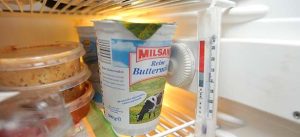Don’t let your kitchen appliances rack up your energy bills. Follow our tips for using less electricity to save energy and money.

______________________________________________________________________________
A well-equipped kitchen is home to some of the most energy-hungry electrical appliances.
When the time comes to buy a new appliance, Which? reviews can save you money in the long run. We put the appliances in our labs through energy use tests, so we can find the ones that won’t rack up your electricity bill.
But if you’re not looking for new appliances, you can still make savings in the kitchen. The way you use your kitchen appliances can also cut your costs.
Follow our expert tips, honed through our years of experience with testing appliances, to cut your energy bills. Read on for more details.
Be energy efficient with your fridge and freezer

- Assuming you’re paying the July 2023 price-capped unit rate of 30p per kWh for electricity, the freestanding fridge freezers we’ve tested in our lab cost an average £90 per year to run. This jumps up to £129 for American-style models.
- Don’t leave the door open longer than necessary. Avoid putting warm food in your freezer as it makes it work harder – allow food to cool down first.
- Defrost frozen food in your fridge. Frozen food will act like an ice pack to help cool the fridge, reducing the amount of electricity the fridge needs to use to keep cool.
- Keep the inside of the fridge between 0 and 5°C, and use a fridge thermometer to check your thermostat is accurate. Lower temperatures decrease energy use, but if it’s too warm your food will spoil.
- For optimum energy efficiency, aim to keep your fridge and freezer at least three quarters full. You could fill them with bottles of water to take up space. But don’t overfill – fridges and freezers work by circulating air around the compartments. If they’re too full, air won’t be able to circulate, and the appliance will use more energy to keep cold.
- Your fridge and freezer run most efficiently when they’re defrosted regularly.
- Use a vacuum cleaner to clean the condenser coils at the back or underneath your fridge or freezer, as thick dust can reduce their efficiency by up to 25%.
Saving energy on cleaning and washing

- Always fully load your washing machine, tumble dryer, washer-dryer or dishwasher. The fuller the load, the more energy efficient the cycle.
- Look for, and use, eco cycles on your domestic appliances. Most modern washing machines and dishwashers have them, and they’re designed to cut electricity and water use. Dishwasher eco programs cut energy use by around 16%.
- Wash lightly soiled clothes at 30°C, with the occasional higher-temperature wash for more heavily soiled clothing. For more tips, see our guide to useful washing machine programs.
- Time your washes carefully. If you’re signed up to an energy tariff that offers cheaper off-peak electricity (Economy 7, for example), set your machine’s delay-start function to come on during the cheaper period.
- If you’re paying the July 2023 price-capped unit rate of 30p per kWh for electricity, the average washing machine would cost you £71 to run. The cheapest to run would cost £28 a year, while the most expensive would cost £101.
Save money and energy on drying clothes

- Don’t hang wet clothes on radiators to dry – use a clothes horse instead – or hang them outside if you can. If you need to use a tumble dryer, wring out or spin dry your clothes before putting them in.
- Tumble drying uses a lot of energy, especially if your dryer is inefficient. One load in a C-rated electric tumble dryer costs around 49p, compared with around just 14p per load in an A-rated heat-pump dryer.
- If you’re paying the July 2023 price-capped unit rate of 30p per kWh for electricity, an average heat pump tumble dryer would cost around £60 a year to run. Condenser models use much more energy, costing an average of £151 a year to run.
- Clean the lint filter every time you use the machine. A blocked filter stops the hot air from circulating freely, so clothes take longer to dry.
- Saving: Instead of tumble drying every couple of days, drying naturally would save you £41 annually if you have the most energy-efficient dryer, or as much as £206 a year if your machine is the most inefficient.
Discover more ways to cut your energy bills with our energy-saving tumble dryer tips.
Saving energy with kettles

- Only fill and boil the kettle with as much water as you need. The most energy-saving kettles have a low minimum-fill line, and switch off swiftly after boiling.
- Descale your kettle regularly. If it’s full of limescale, you use more energy to boil the same amount of water.
- Because gas is cheaper than electricity, it works out slightly cheaper to boil water on a gas hob than using an electric kettle, as long as you are boiling just the quantity you need and switch off the hob as soon as it has boiled.
- And of course, only boil only as much water as you need.
SOURCE: ![]()
